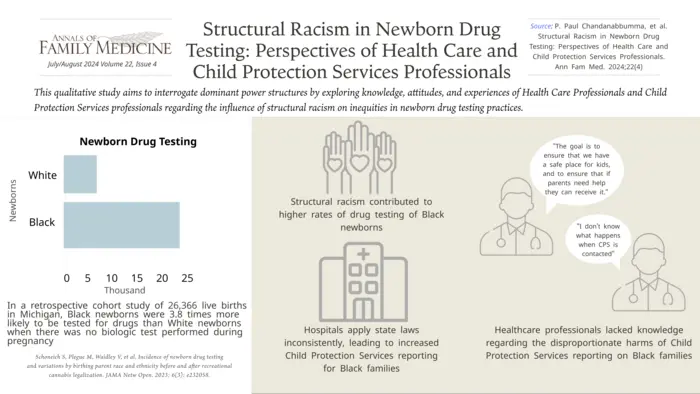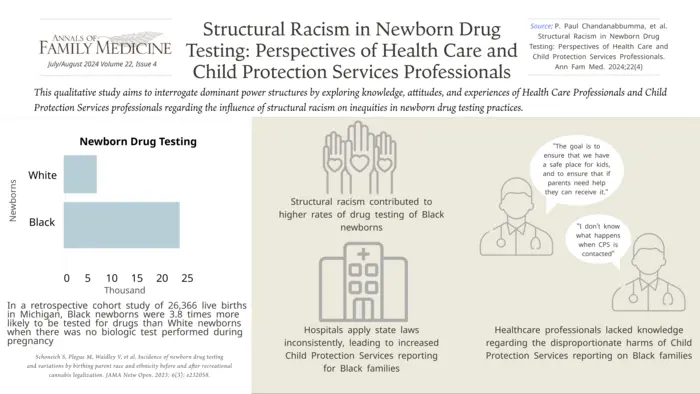Background and Goal: Black birthing parents and their newborns disproportionately experience newborn drug testing for prenatal substance exposure by health care professionals. This practice contributes to Child Protective Services reporting, family separation, and termination of parental rights. This qualitative study, conducted at the University of Michigan in Ann Arbor, MI, explored knowledge, attitudes, and experiences of health care professionals and Child Protective Services professionals regarding the influence of structural racism on inequities in newborn drug testing practices.

Credit: Annals of Family Medicine
Background and Goal: Black birthing parents and their newborns disproportionately experience newborn drug testing for prenatal substance exposure by health care professionals. This practice contributes to Child Protective Services reporting, family separation, and termination of parental rights. This qualitative study, conducted at the University of Michigan in Ann Arbor, MI, explored knowledge, attitudes, and experiences of health care professionals and Child Protective Services professionals regarding the influence of structural racism on inequities in newborn drug testing practices.
Study Approach: This qualitative analysis is the third qualitative phase of a larger antiracist, justice-informed, community-engaged, multiphase mixed methods study. For this phase, researchers conducted semi-structured interviews between May 2021 and October 2022 with 30 physicians, midwives, nurses, social workers, and Child Protective Services professionals. Researchers also conducted inductive, reflexive thematic analysis, using elements of the Levels of Racism Framework, the Theoretical Domains Framework, and the Public Health Critical Race Praxis.
Main Results: Researchers identified three primary themes: (A) Levels of racism beyond the hospital structure contributed to higher rates of drug testing of Black newborns; (B) Inconsistent hospital policies led to racialized application of state law and downstream Child Protective Services reporting; and (C) health care professionals’ knowledge of the benefits and disproportionate harms of Child Protective Services reporting on Black families influenced their testing decision making.
Why It Matters: Health care professionals recognized structural racism as a driver of disproportionate newborn drug testing, but their beliefs, lack of knowledge, and skill limitations were barriers to dismantling power structures impeding systems-level change.
Structural Racism in Newborn Drug Testing: Perspectives of Health Care and Child Protective Services Professionals
P. Paul Chandanabhumma, PhD, MPH, et al
Department of Family Medicine and Institute for Healthcare Policy and Innovation, University of Michigan, Ann Arbor, Michigan
PRE-EMBARGO LINK (Link expires at 5 p.m. July 22nd, 2024)
PERMANENT LINK
Journal
The Annals of Family Medicine
Article Title
Structural Racism and Inconsistent Hospital Policies Result in Health Care Professionals Disproportionately Testing Black Newborns for Prenatal Drug Exposure
Article Publication Date
22-Jul-2024





